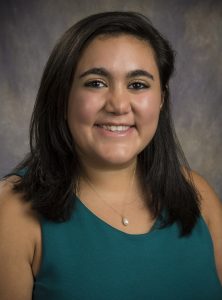
Katie Adib, a second-year medical student at the Wright State University Boonshoft School of Medicine, volunteer in Jordan with Atlantic Humanitarian Relief.
Katie Adib, a second-year medical student at the Wright State University Boonshoft School of Medicine, recently traveled to Jordan to volunteer in women’s health and education efforts. The experience helped her to develop patient skills as well as a budding passion for obstetrics and gynecology.
Adib, who is of Syrian descent and speaks the country’s language, mostly served as a translator for American medical doctors during the expedition. It took place in October 2016 as part of a program with Atlantic Humanitarian Relief, a Boston-based nonprofit aid organization.
Adib and others volunteered in Amman, the capital city of Jordan, as well as Al-Koura, Aghwar, Jerash, and several refugee camps. Most of the patients Adib saw were refugees from the war-torn country of Syria.
“Our focus was to make sure the woman was comfortable with us. We brought feminine products and related items to make sure they could stay clean,” Adib said. “We wanted to minimize complications for their situation, like reducing the chance of developing a yeast infection. We gave prenatal vitamins to some women. Oral contraceptive pills helped others with irregular periods. A lot of things came down to educating them — how you take care of yourself and your body.”
The lack of knowledge was surprising in some cases, Adib said. There were women who didn’t know that they should routinely change their undergarments to guard against yeast infections. Others, due to cultural norms, were concerned with protecting their virginity, or “girlness,” and would refuse treatments. It was Adib’s job to clear up their confusions and alleviate their fears.
Growing up in Dayton, Adib assumed that the patients she cared for in Jordan would know more about women’s health than they did. Still, she wasn’t completely surprised by the lack of knowledge they have.
“My family is Syrian, and we used to go to Syria all the time. I knew the culture going in. We probably treated about 200 women a day and heard their stories about how they thought the female body works,” Adib said.
Many men also lack understanding. Often, they don’t know there’s a certain time of the month women can get pregnant or about the dangers of numerous pregnancies. “There’s a big disconnect between women’s health and the culture,” Adib said.
She recalled a young girl who likely had a yeast infection. But the patient hesitated to go through with treatment because of the way the medicine is administered. Her fear was that no man would marry her if she lost her girlness.
“I wanted to make it clear to them that this won’t take away their womanhood or compromise their girlness,” Adib said. “They’ll still feel like they’re girls and not women.”
Adib saw pregnant patients with high blood pressure, a symptom of preeclampsia. These women were helped with prenatal vitamins. Other patients were educated about family planning.
The experience taught her new patient skills. She also learned to ask tough questions and follow up with patients. Many times, the physicians she traveled with wanted her to ask patients more precise and sensitive questions. In addition, Adib learned not to make assumptions.
“I learned not to assume things we think about others and to stay sensitive when speaking to patients,” Adib said. “They’re speaking to an American physician. There’s a big cultural difference. How can I keep them comfortable when I’m talking to them?”
While Adib did help treat some Jordanian women, most of her patients were from Syria. She noticed how those from Jordan had more confidence and were more assertive, while refugees often dealt with issues like depression or post-traumatic stress disorder. Traveling and living in camps also put them at higher risk of rape and sexual violence.
“It’s really pushed me to advocate more for Syrian women and their reproductive health because they’re suffering more than other refugees in terms of health care,” Adib said.
In the future, the experience may also spur Adib to pursue work in obstetrics and gynecology.
“After this trip, I’m really interested in obstetrics and gynecology and in being an advocate for women refugees so their voices can be heard. Treating a woman for her health care could change her whole life and let her do amazing things. I think we could open the world to them,” she said. “The Syrian refugees, in general, are some of the most resilient people you’ll ever see. They’re the ones who inspired me.”
For more information about volunteering with Atlantic Humanitarian Relief, contact Adib at adib.2@wright.edu.
The Wright State University Boonshoft School of Medicine is a community-based medical school affiliated with seven major teaching hospitals in the Dayton area. The medical school educates the next generation of physicians by providing medical education for more than 444 medical students and 443 residents and fellows in 13 specialty areas and 10 subspecialties. Its research enterprise encompasses centers in the basic sciences, epidemiology, public health and community outreach programs. More than 1,500 of the medical school’s 3,229 alumni remain in medical practice in Ohio.

 Wright State business professor, alumnus honored by regional technology organizations
Wright State business professor, alumnus honored by regional technology organizations  Wright State University Foundation awards 11 Students First Fund projects
Wright State University Foundation awards 11 Students First Fund projects  Gov. DeWine reappoints Board Treasurer Beth Ferris and names student Ella Vaught to Wright State Board of Trustees
Gov. DeWine reappoints Board Treasurer Beth Ferris and names student Ella Vaught to Wright State Board of Trustees  Joe Gruenberg’s 40-Year support for Wright State celebrated with Honorary Alumnus Award
Joe Gruenberg’s 40-Year support for Wright State celebrated with Honorary Alumnus Award  Wright State’s elementary education program earns A+ rating for math teacher training
Wright State’s elementary education program earns A+ rating for math teacher training 